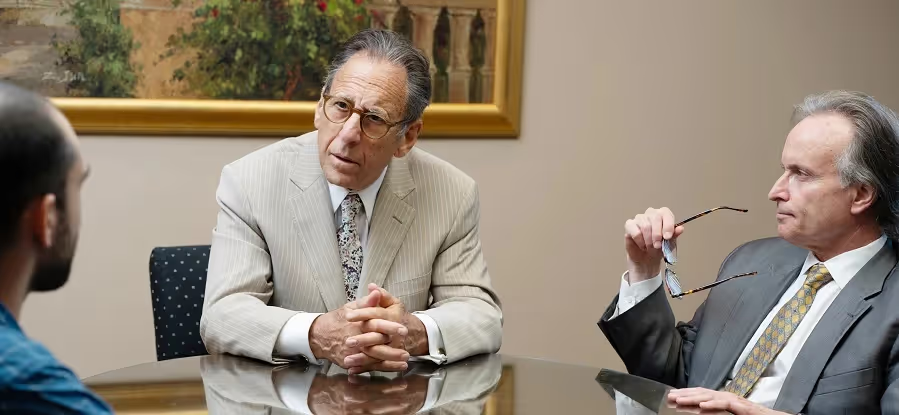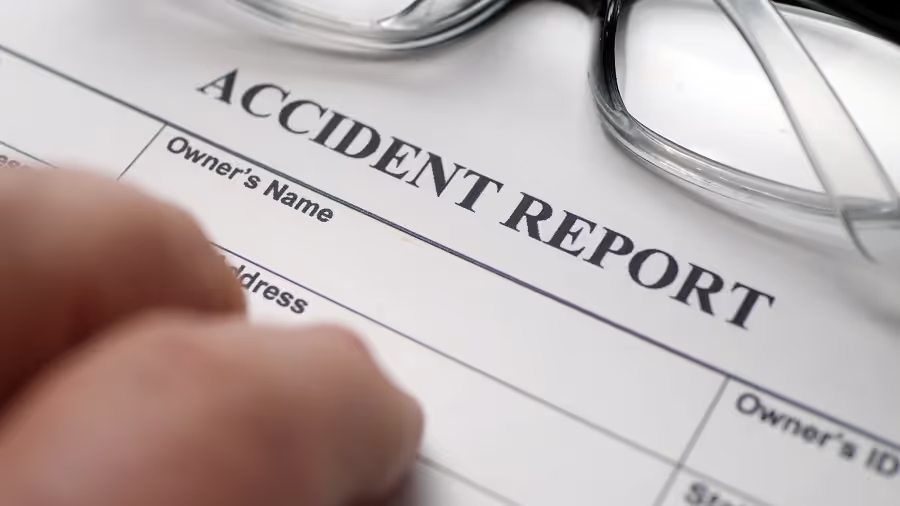Rob Fellows is a renowned personal injury attorney with over 40 years of experience. As managing partner at Fellows Hymowitz Rice, he is known for his meticulous preparation and aggressive advocacy in the courtroom.
Personal injury cases in New York present unique challenges for victims seeking justice and compensation. The bustling cityscape, complex highway networks, and numerous busy workplaces contribute to a high incidence of accidents and injuries.
New York's legal landscape, with its "no-fault" insurance system and comparative negligence laws, adds layers of complexity to these cases. In this high-stakes environment, even minor oversights can have far-reaching consequences.
At Fellows Hymowitz Rice, we've dedicated our practice to guiding New Yorkers through the maze of personal injury law. Our experienced New York State personal injury attorneys know the nuances of New York's legal system and the tactics insurance companies use.
We've successfully represented clients in various personal injury claims, from car accidents to medical malpractice claims, providing compassionate support and tireless advocacy.
To help you deal with personal injury law and maximize your chances of a favorable outcome, we've compiled this list of critical mistakes to avoid when pursuing a personal injury case in New York.

Delaying Medical Treatment After an Accident
Delaying treatment can have serious repercussions:
- It may weaken the link between the accident and your injuries.
- Insurance adjusters might argue your injuries aren't as severe as claimed.
- Your recovery could be compromised, leading to long-term health issues.
It's necessary to seek medical attention immediately after any accident, whether it's an auto collision claims, construction accidents, slip and fall injuries, or even a sports injury — even if you don't feel immediate physical pain. Some injuries, particularly those involving the head or spine, may not manifest symptoms right away.
This is not just a matter of personal health but also a legal obligation in some cases. For instance, New York Vehicle and Traffic Law § 600 requires drivers involved in accidents resulting in injury to stop and ensure that injured parties receive medical attention.
To protect your health and personal injury case:
- Visit a healthcare provider immediately after the incident.
- Seek immediate medical attention, even if you feel fine.
- Attend all follow-up appointments and adhere to the treatment plan.
- Keep detailed records of all medical visits, treatments, and medical bills.
- Discuss any concerns with your doctor rather than discontinuing care.
Remember, insurance companies aim to minimize payouts. They may argue that your injuries are unrelated to the accident if there's a delay in seeking medical treatment. By getting medical care promptly, you're not only protecting your health but also strengthening your legal position.

Inadequate Documentation of the Accident Scene
Proper documentation provides crucial support for your claim. Neglecting this step can significantly weaken your case. Without as much evidence as possible, it becomes your word against the other party's, and important details may be forgotten or disputed later. This is especially true in case of a car accident, for example, where the scene can be cleared quickly.
Essential Steps for Thorough Documentation
Take these steps to ensure comprehensive documentation:
- Gather evidence by photographing the accident scene, including property damage and visible injuries.
- Collect witness contact information, including names, phone numbers, and addresses.
- Call the police and file a police report, even for seemingly minor incidents.
- Preserve any physical evidence related to the accident, such as damaged clothing or equipment.
- Keep a journal detailing the incident and its impact on your daily life, including emotional distress.
- Use your smartphone to record video footage of the scene if it is safe to do so.
- Sketch a diagram of the scene, noting the positions of vehicles and any relevant road features.
If you are severely injured, documenting the scene of the accident may be difficult. Asking others around you to take photos or relying on police records are other options that may provide valuable evidence.
How to Create a Personal Accident Report
In addition to the official police report, creating your own detailed accident report can be invaluable. This personal account can serve as crucial evidence as your case progresses, helping to refresh your memory and provide your personal injury lawyer with valuable insights. Include information such as:
- Weather conditions at the time of the accident.
- Traffic patterns and road conditions.
- Precise location details, including nearby landmarks or street signs.
- Any statements made by the at-fault driver or other parties involved at the scene.
- Your immediate physical and emotional reactions following the accident.
- Names and badge numbers of responding police officers.
- Details about any emergency medical treatment received at the scene.
By taking these thorough documentation steps, you create a solid foundation for your personal injury claim. This comprehensive approach can make a significant difference in the strength and success of your case, providing your attorney with the necessary tools to build a compelling argument on your behalf.

Providing Recorded Statements Without Legal Counsel
Insurance adjusters often pressure claimants to give a recorded statement shortly after an accident. This can be a precarious situation:
- Statements given without legal advice can be used to undermine your claim.
- Insurance providers may use your words out of context to reduce their liability.
- You might inadvertently admit fault or downplay your injuries.
Protect your interests by taking several precautions. Politely decline to provide a recorded statement until you've consulted with a personal injury attorney. Refer the insurance company to your legal representation for all communication.
Be cautious about what you say, even in casual conversations with insurance representatives. Finally, prepare any necessary statements with your attorney's guidance.
Accepting an Early Settlement Offer
Insurance companies often make quick, lowball offers, hoping to settle claims before the full extent of injuries is known. Early settlements rarely account for long-term medical needs or complications, and once you accept an offer, you typically can't seek additional compensation later. You might underestimate future lost wages or diminished earning capacity.
Instead:
- Consult with an experienced attorney before accepting any settlement offers.
- Wait until you've reached maximum medical improvement to fully understand your long-term needs.
- Consider future damages, including medical expenses, lost wages, and quality of life impacts when evaluating offers.
- Let your personal injury lawyer handle negotiations to ensure you have the best chance of receiving fair compensation.
When you’re dealing with bills, lost wages, and medical costs, it can be tempting to accept a settlement as quickly as possible. Don’t make this mistake. You deserve to be fully compensated for all of your losses.
Oversharing on Social Media
In today's digital age, your online presence can have real-world consequences for your personal injury claim. Insurance companies and defense attorneys often scour social media for evidence to dispute your injuries. Even innocent posts can be misinterpreted and used against you. Comments from friends or family about your activities could contradict your injury claims.
Protect your case by considering a temporary deactivation of your social media accounts during the legal process. If you must use social media, avoid posting about your accident, injuries, or activities.
Ask friends and family not to tag you in posts or share information about your case. Additionally, adjust your privacy settings to limit public access to your profiles.

Misrepresenting Your Injuries or Medical History
Honesty is paramount in personal injury cases. Exaggerating your injuries or failing to disclose pre-existing conditions can severely damage your credibility. Misrepresentations can be grounds for dismissing your entire case, and insurance companies have the resources to uncover inconsistencies in your medical history.
To maintain your integrity and strengthen your case:
- Be truthful about your injuries and their impact on your life.
- Disclose any pre-existing conditions to your attorney and healthcare providers.
- Let the medical evidence speak for itself without embellishment.
If you're unsure about the extent of your injuries, express this uncertainty rather than speculating.
Failing to Keep Detailed Records
Proper documentation is the backbone of a strong personal injury claim. Neglecting to keep thorough records can weaken your position. Detailed records provide concrete evidence of your damages and expenses.
Maintain comprehensive records by:
- Keeping a daily journal documenting your recovery process and how the injury affects your well-being.
- Saving all medical bills, receipts for out-of-pocket expenses, and documentation of lost wages.
- Recording any conversations with insurance companies or other parties involved in your case.
- Obtaining and organizing all relevant medical records and diagnostic test results.
- Documenting any modifications made to your home or vehicle due to your injuries.
Organizing your records and presenting them to your attorney as soon as possible can allow your legal team to make quick progress in building your case.

Waiting Too Long to File Your Claim
New York has specific time limits for filing a personal injury lawsuit. Missing these deadlines can have severe consequences, potentially barring you from seeking compensation altogether.
Once the statute of limitations expires, you lose your right to pursue legal action, regardless of the merits of your case. Additionally, waiting too long can make it harder to gather evidence and build a strong case.
To protect your right to compensation:
- Consult with a personal injury lawyer as soon as possible after your accident.
- Be aware of the specific time limits that apply to your type of case.
- Start the legal process early to ensure all deadlines are met.
- Allow ample time for your attorney to thoroughly investigate and prepare your case.
For cases involving birth injuries or wrongful death claims, these timelines can be particularly complex, making early legal consultation even more critical.
Neglecting to Seek Legal Representation
Attempting to handle a personal injury claim on your own can lead to costly mistakes and reduced compensation. Personal injury law is complex, and insurance companies have teams of lawyers on their side. Without legal guidance, you may overlook critical aspects of your claim or settle for less money than you deserve.
To safeguard your interests, consider consulting with a reputable personal injury attorney who is trained to handle cases like yours. Many attorneys offer free initial consultations, which can help you understand your legal options without any financial commitment.
Once you've chosen an attorney, let them handle negotiations and legal procedures while you focus on your recovery. This allows you to concentrate on getting better while an attorney manages the complexities of your case.
Finally, make sure to provide your attorney with all the relevant details and documentation to build a strong case. The more information they have, the better equipped they'll be to represent your interests effectively and secure the compensation you deserve.
Seeking Assistance from Dedicated Attorneys
By avoiding these common mistakes and working closely with an experienced personal injury attorney, you can significantly improve your chances of receiving fair compensation for your injuries.
At Fellows Hymowitz Rice, we're committed to guiding you through every step of the legal process, ensuring your rights are protected and your voice is heard. Don't let simple oversights jeopardize your case. Contact us today for legal guidance tailored to your unique situation!

Protect Your Rights After an Injury
Don't let insurance companies take advantage of you. Contact our experienced personal injury attorneys today for a free consultation and case evaluation! We’ll put our experience to use in your case and fight tirelessly for what you’re owed.
Contact Us
Heading
Lorem ipsum dolor sit amet, consectetur adipiscing elit, sed do eiusmod tempor incididunt ut labore et dolore magna aliqua. Ut enim ad minim veniam, quis nostrud exercitation ullamco laboris nisi ut aliquip ex ea commodo consequat. Duis aute irure dolor in reprehenderit in voluptate velit esse cillum dolore eu fugiat nulla pariatur.






